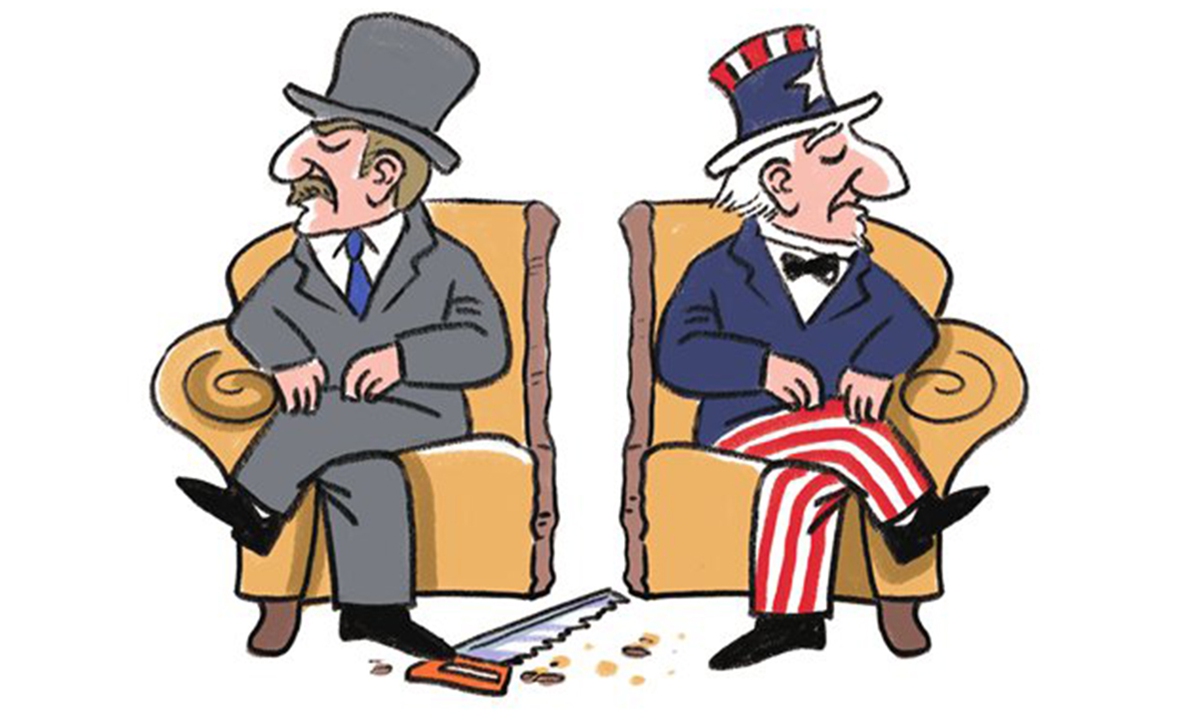
Illustration: Liu Rui/GT
The European Union (EU) on Wednesday reopened its external borders to 14 countries with low COVID-19 infection rates. The US is not on the list. China will only be considered if it allows reciprocal access to China for EU travelers, according to media reports.
The EU extending its travel ban over visitors from the US is mainly out of the bloc's disappointment over the US' mishandling in controlling the novel coronavirus pandemic. In a bid to win reelection, President Donald Trump blindly demanded to reopen economic and social activities while the disease still raged unabated. This likely will lead to more infections and deaths.
Against this backdrop, if the EU reopens access to the US, the life safety and health of Europeans will be put at risks.
This decision also reveals the EU's distrust over the US. Cranking up the "America First" policy, Washington has ruthlessly sacrificed the interests of its allies in an attempt to maintain its own chest-beating prowess. The US' selfishness has been on full display amid the pandemic. For example, Berlin accused the Trump administration of "modern piracy" after face masks bound for Germany were instead re-directed to the US.
Furthermore, the EU has raised its doubt over the US' capability to deal with crises as a result of its poor performance in tackling COVID-19. Forecasts do not see the US, the largest economy in the world, further coping well with the pandemic as it leads with the highest confirmed cases and death count globally.
Additionally, Brussels diverges from Washington on several domains. The EU attaches great importance to multilateral cooperation. Yet the Trump administration underlines unilateralism and protectionism, as exemplified by its practices of pulling out from international organizations or pacts - these include the Paris Climate Agreement, UNESCO and WHO. Trump has also launched a trade war against the EU. These moves from Washington disappoint Brussels.
China is on the list of countries that the EU will reopen to, albeit with conditions. It shows the EU's recognition of China's achievement in fighting the epidemic, so it is qualified to be considered as a country with "low" infection rates.
Gravely hit by COVID-19, the bloc members' economy is desperately in need of recovery. Expenses spent by Chinese visitors have become significant sources of income for many EU members. They are eager to resume normal economic and people-to-people exchanges with China, in order to boost their economy.
On the other hand, the EU highlights trust, equality and reciprocity in policies toward China regarding the matter of reopening borders.
The Brussels may hope to deliver a message to Beijing that the bloc wants China to reopen its border to Europeans. This is because China is the EU's second largest trade partner. If China allows Europeans' access, their business with the second-largest economy is expected to resume.
China at present has not reopened to the EU. This is to prevent imported cases as a core health strategy.
The Chinese government always puts its people's health and safety as its highest priority. The central government refuses to sacrifice people's lives in exchange for short-term economic stimulus. This also explains why China has not reopened its borders.
The New York Times said barring travel from the US "is a stinging blow to American prestige in the world and a repudiation of Trump's handling of the virus in the US." This comment sounds rational. Since Trump took office, the US' declining global reputation has become obvious to all. The US reaction to the pandemic magnifies this even more.
Apart from its disappointing performance in preventing the spread of the deadly virus, Washington has spared no effort to stigmatize and pass the buck to China and the WHO. It then went ahead and blindly resumed its economy regardless of the high risks of rising infection rates. This is inconsistent with how the US as a global superpower should responsibly behave. This series of egregious actions raises serious doubts from the international community over US' capability to manage regional and global governance.
The author is Jean Monnet Chair Professor and director of center for EU studies at Renmin university of China. opinion@globaltimes.com.cn

